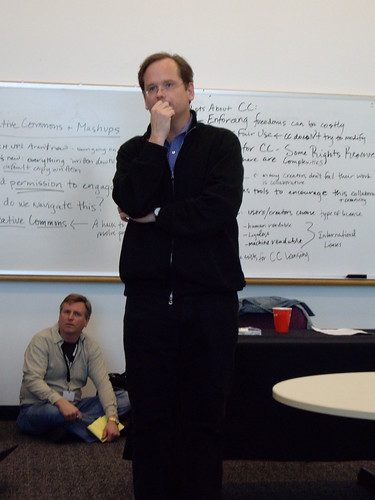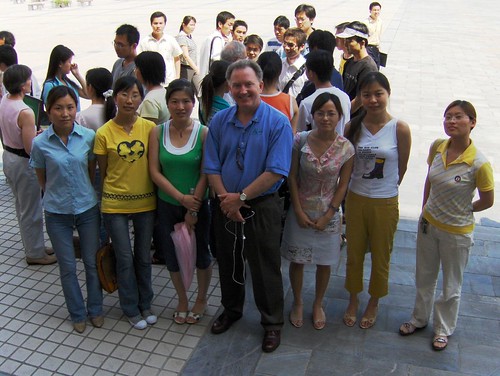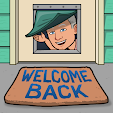 Along with the Cluetrain Manifesto (see other blog post), these are the other books I've read lately. I recommend all of them as being well-written, entertaining, and informative.
Along with the Cluetrain Manifesto (see other blog post), these are the other books I've read lately. I recommend all of them as being well-written, entertaining, and informative.
Two of the books are by Robert Kiyosaki, including the standard Rich Dad, Poor Dad as well as Before you Quit Your Job, one of the many follow-up books in the series. Although some people hate these books (typical of all personal finance and entrepreneurism books), I find his advice to be pretty solid and I agree with the distinctions that he makes between being an employee and being an entrepreneur. He makes an excellent point (pg. 48) about most business school graduates when he discusses the "bean counters." I have nothing against business schools per se having taught accounting for 17 years at various colleges and universities, but he is correct when saying that oftentimes when they take over a business the result is financial ruin due to their simplistic approaches to short-term cost savings. He also asserts that union representation is more needed by specialized workers with non-transferable skills (pg 138). Business schools basically teach people how to be employees. Employees rarely succeed beyond their wildest dreams. Kiyosaki also writes a column for Yahoo! Finance. Small Pieces, Loosely Joined, by David Weinberger. He has many interesting questions about the Web and how it is changing our lives and more than a few interesting answers. Weinberger analyzes how the Internet has affected education, social interaction, business, and government. I especially enjoyed his treatment of the Web as "space" which is strange since it takes up no space but it feels like it does. Quoting Lawrence Lessig: "Someday, someone was going to notice that the Internet is not just virtual, but instead connects to, and fundamentally affects, society. In this rich and beautiful text, Weinberger weaves an account of the places in our social and conceptual fabric where the Internet will pull, and possibly tear. This is not a book about the Internet and society; it is about society, marked with the net. " You can read the first three chapters online if that suits you, although something funky happens to the text in both IE and Firefiox . Weinberger is also the publisher of JOHO (Journal of the Hyperlinked Organization), author of JOHO the Blog, a co-author of the Cluetrain Manifesto, and many other things.
Small Pieces, Loosely Joined, by David Weinberger. He has many interesting questions about the Web and how it is changing our lives and more than a few interesting answers. Weinberger analyzes how the Internet has affected education, social interaction, business, and government. I especially enjoyed his treatment of the Web as "space" which is strange since it takes up no space but it feels like it does. Quoting Lawrence Lessig: "Someday, someone was going to notice that the Internet is not just virtual, but instead connects to, and fundamentally affects, society. In this rich and beautiful text, Weinberger weaves an account of the places in our social and conceptual fabric where the Internet will pull, and possibly tear. This is not a book about the Internet and society; it is about society, marked with the net. " You can read the first three chapters online if that suits you, although something funky happens to the text in both IE and Firefiox . Weinberger is also the publisher of JOHO (Journal of the Hyperlinked Organization), author of JOHO the Blog, a co-author of the Cluetrain Manifesto, and many other things. Freakonomics, by Levine and Dubner. In case you've missed it, this book created a great deal of controversy when it first came out. Several chapters have provocative (Boys and girls, can you say "off the wall"? Sure, I knew you could) theories, ideas, or assertions; such as the following: (1) legalized abortion has reduced the crime rate, (2) there is overwhelming evidence of cheating by teachers and students on standardized tests in the wake of No Child Left Behind, (3) more money doesn't actually help political candidates get elected, and (4) it is 100 times more likely that your child would be harmed while visiting the home of a friend with a swimming pool than one with a gun in the house.
Freakonomics, by Levine and Dubner. In case you've missed it, this book created a great deal of controversy when it first came out. Several chapters have provocative (Boys and girls, can you say "off the wall"? Sure, I knew you could) theories, ideas, or assertions; such as the following: (1) legalized abortion has reduced the crime rate, (2) there is overwhelming evidence of cheating by teachers and students on standardized tests in the wake of No Child Left Behind, (3) more money doesn't actually help political candidates get elected, and (4) it is 100 times more likely that your child would be harmed while visiting the home of a friend with a swimming pool than one with a gun in the house.
Between keeping up with the writings of about 75 bloggers and making this serious dent in my off-line book reading list, I've probably never read this much in my life except probably when I was a student and had reading forced upon me. My biggest problem is that the more I read the more I want to make a substantial change in my lifeand career. That doesn't even make sense, but there's probably nothing I can do about that.
Friday, June 30, 2006
Good Reads
Thursday, June 29, 2006
Net Neutrality
The education world is abuzz with talk about Net Neutrality, and seems to be on the opposite side of the fence from both bodies of Congress.
- Latest Senate action 6/28/06 (not good)
- Why it's important to education
- Save the Internet website
- What Educause says
- What the inventor of the Internet says (no, not Al Gore)
- Crawford vs. Yoo: two views
- MnSCU Board of Trustees takes a stand
- Competitive Enterprise Institute (conservatives)
- Hands Off the Internet (misnomer, IMO)
- I could find more, but why should I?
Sunday, June 25, 2006
Creative Commons for MS-Office
Office Add-in: Creative Commons Add-in for Microsoft Office
It just keeps getting easier. This add-in enables you to embed Creative Commons licenses directly into Word, PowerPoint, and Excel documents (sorry, not for Mac Office users yet).
From the MS website:
This add-in enables you to embed a Creative Commons license into a document that you create using the popular applications: Microsoft Office Word, Microsoft Office PowerPoint, or Microsoft Office Excel. With a Creative Commons license, authors can express their intentions regarding how their works may be used by others.
The add-in downloads the Creative Commons license you designate from the Creative Commons Web site and inserts it directly into your creative work. Creative Commons supports a number of languages.
To learn more about Creative Commons, please visit its web site, www.creativecommons.org. Use this link to learn more about the choices among the Creative Commons licenses.
If you missed my earlier post about creative commons, go here.
Friday, June 23, 2006
Bob Nab Memorial
I'm in Cheyenne, Wyoming for a few days visiting my mom for the dedication of a baseball memorial to my dad, Bob Nab. The main reason I'm posting about it here is to test the embed URl for the video that I posted on You Tube. You might not be interested in the content of the video, but I wanted to see whether this is an effective way of sharing videos. It may take a few seconds to load after you click the play button.
Sunday, June 18, 2006
Grandma's 2006


I did it! With great pain and a tremendous lack of mental fortitude, I finished the Garry Bjorklund half marathon in Duluth on Saturday, June 17, 2006. OMG!! The pain was much more than I anticipated. For someone who was formerly a very experienced 10K runner (20 years ago, almost feels like a former life), I couldn't believe what a difference it makes to run those extra miles.
In the old days I was all about speed. I could run at a six minute per mile pace for the 6.2 miles of a 10K. Probably never ran more than 7 miles on any one day in my life, and that includes the "training" I did for the half marathon which was minimal at best. As you can imagine, it is hard on the psyche to end up with a pace of almost 11 minutes per mile after mixing in several walking stretches just to make sure I didn't pass out. Now it is the day after and I have never had such pain in my legs. Going up the stairs hurts, but going down the stairs is about five times as bad.
My friend Mark Peterson (# 988 in the picture) is the CIO at Inver Hills CC and he ran with me for the first twelve miles but I just couldn't keep going so I pulled back and let him keep running all the way to the finish. He has done this several times and knew exactly how to handle it. As painful as this was, I'll still consider doing it again next year since I really believe that I can do better....and I'm all about continuous quality improvement (although my legs are not in agreement right now).
Wednesday, June 14, 2006
Corruptibles
The Corruptibles! Here is a fun, informative, and somewhat scary cartoon about the erosion of our personal rights from the Electronic Frontier Foundation who says that " Hollywood wants Congress to give it new super powers over your TV, radio, and computer." Ick.
About Copyright
I attended a workshop today about copyright infringement in education. The presenters put together an excellent handout and had enough material for a two-hour presentation rather than 50 minutes. They also used an audience response system to quiz us on some questions about copyright, fair use, and similar things. The presenters (Bob Griggs and Paul Sedlacek) did a great job.
However, I think that some of the recent developments in the world of copyright really need to be discussed in these types of forums. There was no mention whatsoever about Creative Commons. This movement to more open sharing of copyrighted materials, and the ability to grant permission BEFORE someone asks is a major step forward for educators. It is becoming easier all the time to get permission to use someone’s work for non-commercial purposes. For example, while sitting in the session I went to the Creative Commons site and did a text search for information about copyright law. Here is an example of what I quickly found that I would be able to use for my own instructional purposes because of the Creative Commons licensing: A Politics of Intellectual Property: Environmentalism For the Net? by James Boyle.
The same is true with photos, videos, and many other creative works. Flickr for example allows you to search for photos that you can use under Creative Commons licensing. Here’s a photo of Dr. Lawrence Lessig by jarrodlombardo:
Also, for all people interested in copyright and other issues related to intellectual property, I would highly encourage that you check out the book titled The Future of Ideas by Lawrence Lessig (thus, the reason for his picture). In the book, Lessig gives a great deal of information about the history of copyright laws and how the laws have been expanded to cover so many things that were not intended in the early days. Here’s an excerpt, but it’s not the best part.
Tuesday, June 13, 2006
Kent Kedl - Minnesota Connection
He is an engaging speaker and has obviously learned a great deal about doing business in China since has spent the better part of the past twenty years there. These are just a few of the take-aways for me:
- There are over 170 cities in China with a population of over 1 million.
- Since 1993, the GDP has increased by 570%.
- 94 million Chinese people have web access in their homes, with about half of that with broadband, and growing quickly.
- In China, strategy must lead structure. In other words, do some thorough, objective, systematic research before deciding that you must be in China.
- Many Chinese people are tired of hearing Americans talk about a win-win situation. Too often that means that the Americans win twice.
- And most importantly (for me), what are your motivations for doing business in China? What bad things will happen if you don't? What are the outcomes that you are really looking for, and why is China the right place to achieve those outcomes?
Saturday, June 10, 2006
Chinese Kids

 Absolutely the best highlights of the China trip were different occasions where I could talk with some of the kids over there. I talked for about ten minutes with a group of high school students on the steps to their school, and then went to a middle school where I talked to a group of 8th graders for about 20 minutes or so. The group started out with about ten students and had grown to about 25 by the time I had to go. One thing that really struck me was how totally respectful they were. I couldn't help but think what it would be like for a Chinese educator to be visiting one of our schools here in the states. The difference in discipline is striking.
Absolutely the best highlights of the China trip were different occasions where I could talk with some of the kids over there. I talked for about ten minutes with a group of high school students on the steps to their school, and then went to a middle school where I talked to a group of 8th graders for about 20 minutes or so. The group started out with about ten students and had grown to about 25 by the time I had to go. One thing that really struck me was how totally respectful they were. I couldn't help but think what it would be like for a Chinese educator to be visiting one of our schools here in the states. The difference in discipline is striking.
One thing that was kind of funny with both groups was how surprised they were that I was trying to learn to speak Chinese. They found that to be very odd, probably because they are all working so hard to become fluent in English. I got the impression that they didn't think I should spend my time learning Chinese since they were learning English and we would therefore be able to communicate. They got a big kick out of listening to the Chinese language podcasts on my video iPod. These kids were clearly intrigued by anything Western. So much so that I took the opportunity to give them a mini-lecture about hanging onto their heritage and not trying to be like us (U.S.), to embrace who they are, and be proud of their culture. I guess you had to be there...sounds pretty lame now, but didn't at the time, IMO.
Tuesday, June 06, 2006
The Great Firewall
It looks like I might have been able to get around the Blogspot blockade in China if I had taken the time to do a little more research. Quite frankly, sitting in my hotel room doing web research wasn't my first choice for spending my limited time in a fascinating country where you can smell the progress all around you.
The comments in this blog post (especially #6 & #16) give some insight how to get around the government's somewhat lame attempt at blocking content. Another post and comments from 2004 & 2005 indicates that the blockade seems to come and go rather frequently. BTW, I love the phrase "The Great Firewall of China."
The Great Wall was overrun by vendors trying to sell you their stuff. Capitalism is alive and well in China. They haul their goods up and down the wall every day in order to provide you with a shopping experience at every "resting place" along the way. Where we climbed it was a heck of an incline. I suspect that the vendors are in pretty good shape, as are most of the people in China. Visiting the Great Wall was not one my trip highlights as I expected it to be. Still glad I went there, but it was one of the few times that I really felt like I was in a tourist trap.

Monday, June 05, 2006
Blocked in C hina
I just returned from a 12-day trip to China. Imagine my frustration when I tried to access my blogs from there on the first night in the hotel room. All Blogger and Wordpress blogs are blocked in China, but most others don't seem to be. I had planned to post daily updates of our adventures. It was hard not being able to post. I guess the blogs had become part of my normal routine. I'll make a few posts in the next couple of days about the China experiences, but it's just not the same as doing it from there in real-time.



